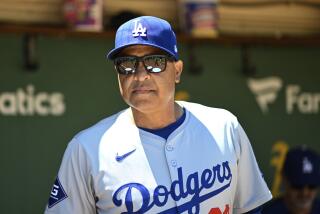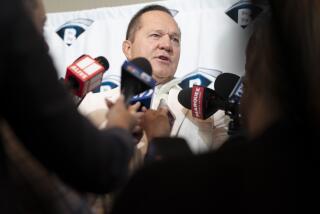BASEBALL ON STRIKE : A Major Dilemma: Play or Not : Replacement Prospects Are Being Courted for Jobs They Only Dream About
- Share via
Dana Ridenour spent most of the last 4 1/2 months working 65 hours a week waiting tables at a Florida seafood restaurant and loading trucks for United Parcel Service.
With a wife and a young son to support, and another baby due any day, Ridenour also found time to mix in off-season workouts in preparation for his 10th season as a professional baseball player.
A former standout pitcher at Sylmar High and UCLA, he never has appeared in a major league game. The 29-year-old right-hander has never made more than $30,000 in a season.
So when Gregg Jefferies, who recently signed a multimillion-dollar contract with the Philadelphia Phillies, was quoted as saying that life for replacement players would be a nightmare after the baseball strike ends, Ridenour was unshaken.
“Nightmare?” Ridenour said. “He hasn’t worked at UPS during the Christmas season.”
Ridenour, who signed a triple-A contract with the Chicago Cubs two weeks ago, was one of more than 400 minor league free agents who are the most likely candidates to serve as replacement players should baseball’s labor dispute continue into spring training and the 1995 season. Recently retired and released majorleaguers, contractually bound minor league players and college and semi-pro players have also been discussed as potential replacements.
The anticipated need for viable players has sent major league general managers and scouts into a reluctant scramble to fill 32-man makeshift rosters. Players who have been denied or given only abbreviated shots at a major league opportunity are openly being courted for jobs that would include a proposed $5,000 signing bonus, a $5,000 bonus for making an opening-day roster, a $115,000 prorated salary and $20,000 in termination pay if the strike is settled. Several teams are also staging tryout camps to identify former minor leaguers who might be part of the replacement-player mix.
“The process we’re going through is not just a daily changing event, it’s hourly,” said Chuck McMichael, a Kansas City Royal scout. “We are literally working on it from the time we get up ‘til the time we go to bed. The phone doesn’t stop ringing.”
The Major League Baseball Players Assn. is considering a challenge to the replacement player rules, contending that changes in work conditions cannot be unilaterally implemented without collective bargaining. But that is not expected to stop the majority of veteran minor league free agents from signing on.
The decision was not difficult for Ridenour, who has been the property of the New York Yankees, Seattle Mariners, Montreal Expos, Colorado Rockies and Florida Marlins. Last season, he was 4-9 with a 5.36 earned-run average for the Marlins’ triple-A affiliate at Edmonton.
In April, he could be the opening day starter for the Cubs.
“I don’t disrespect the players’ view or anyone who would not want to cross,” he said. “But I have to take care of my family. I’ve invested nine years in this game and if this is a chance to reap some of the benefits, I’m going to do it.
“The only people who are telling me it’s ridiculous are the Bobby Bonillas, John Francos and Gregg Jefferies, who could buy the restaurant I work at.
“In baseball, they always tell you that as long as you have a uniform on anything can happen. So if the owners are going to have a game and they need players, I’m going to play.”
Rob Nelson might do the same. The 30-year-old first baseman from South Pasadena is preparing for his 13th season.
“I remember when I got to triple-A at 21, I was looking at guys who were my age now and thinking, ‘Why the hell are you still playing? Why don’t you retire?’ ” he said. “Now I understand. I love going out there and playing the game.”
Nelson, who recently signed a minor league contract with Cleveland, accrued more than a year of major league service with Oakland and San Diego between 1986 and 1990 but spent last season with double-A Tulsa in the Texas Rangers’ organization. Nelson, who is married and has three children, said he will make a decision about becoming a replacement player during spring training.
“I’ve never really had the opportunity to go out and play every day at the major league level for an extended time,” said Nelson, who had a career-high 82 at-bats in 42 games with the Padres in 1989. “I’ve always said, ‘Give me 250 straight at-bats and if I don’t do the job, get rid of me.’
“This might be an opportunity for me to open some eyes and really take care of my family. If I don’t take this chance, I’ll always wonder, ‘What if?’ The big ‘What if?’ is something you don’t want to deal with no matter what occupation you work in.”
Some veteran minor leaguers, however, said they will not be replacement players. Don Barbara, a first baseman who played at Long Beach State, recently signed with the Boston Red Sox, his fourth team in three years. Barbara, 26, played for the Dodgers’ triple-A affiliate at Albuquerque last season. He said he signed with the Red Sox because they were one of the organizations that guaranteed him a spot at big league spring training camp even if major league players return to work.
“I want to get to the big leagues, but I want to get there the right way,” he said. “I don’t want to be a replacement player. It’s not fair to the guys who are sacrificing right now for future players.”
Interestingly, the minor league players perceived to have the brightest futures in the majors are unlikely to be solicited as replacements because management is wary of ostracizing them from future teammates and opponents.
Red Sox farmhand Jeff Suppan, 20, considered among the top pitching prospects in baseball, is glad he will not be put in an awkward position.
“When you have a dream, and someone might give it to you by letting you play in the major leagues, it’s tough to say no,” said Suppan, who graduated from Crespi High in Encino. “But I wouldn’t do it. I’m sure if I was getting older or coming off an injury, I would think differently.”
Recent retirees and players who have been released by major league clubs are considered fair game, but the union has threatened to decertify agents who negotiate contracts for union members during the strike. Players from the Northern League and other independent minor leagues are also available.
College players are regarded as a last resort by general managers. But many collegians would no doubt jump at the opportunity to join Dave Winfield, Jim Abbott and John Olerud as some of the few who have gone straight to the major leagues.
“If someone says, ‘Do you want to play for the Yankees tomorrow?’ how do you turn that down?” said UCLA shortstop Gar Vallone. “You’re going straight from Jackie Robinson Stadium to The House That Ruth Built.”
An agreement between Major League Baseball and the NCAA prevents organizations from signing four-year college players until after their junior seasons or their 21st birthdays. The NCAA, however, technically could not prevent major league teams from procuring a talent pool of collegians.
“There’s nothing from our standpoint that we could do to stop (clubs),” said Shane Lyons, a legislative assistant with the NCAA. “But we would try to get the message out to the schools that any student athlete who makes an intent to become a replacement player would be jeopardizing their amateur status. And it could be very difficult to regain.”
Some college players say they would not take the opportunity even if it were presented. Not coincidentally, they are players who are expected to be high draft picks who will be given every opportunity to ascend to the major leagues in the traditional fashion once the strike is settled.
“There’s no way people are going to come out every night to watch college players or any other replacement players being passed off as major leaguers,” said USC outfielder Geoff Jenkins, a preseason All-American. “And my goal is to reach the big leagues by earning it. The whole point is to get there and play against the best players.
“That opportunity is going to be there once they get this thing settled. That’s the opportunity I’m looking to take advantage of.”
More to Read
Go beyond the scoreboard
Get the latest on L.A.'s teams in the daily Sports Report newsletter.
You may occasionally receive promotional content from the Los Angeles Times.











